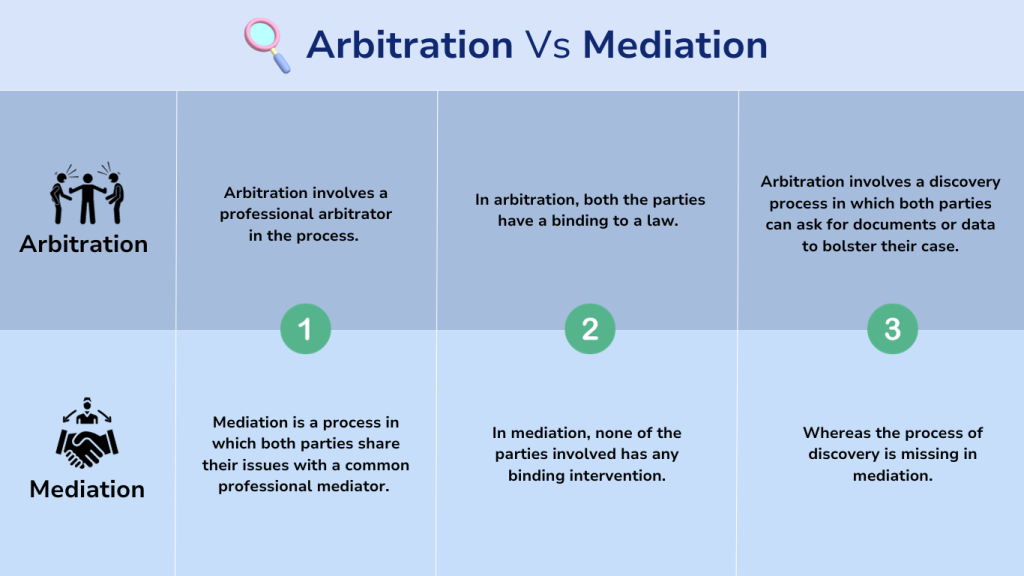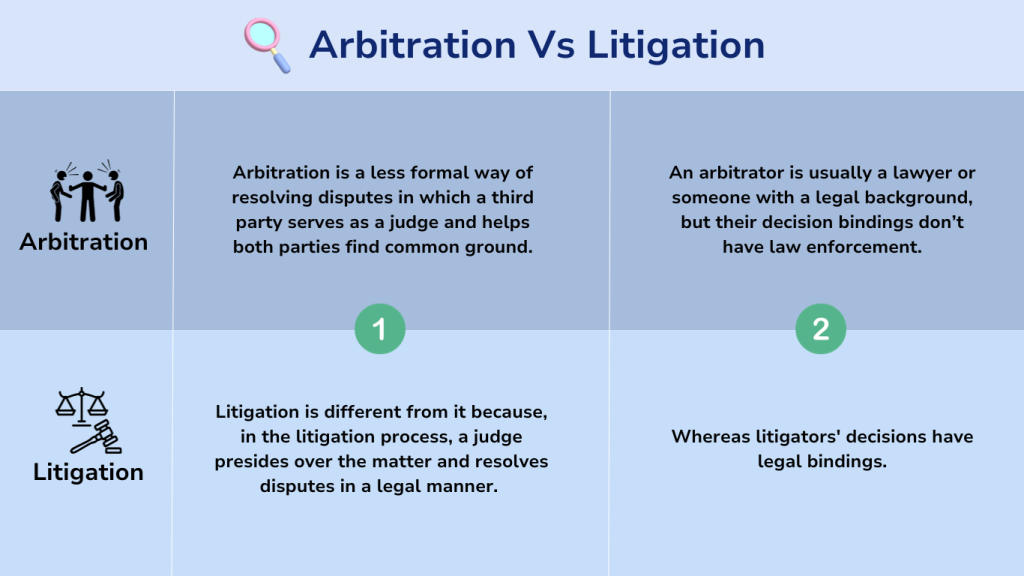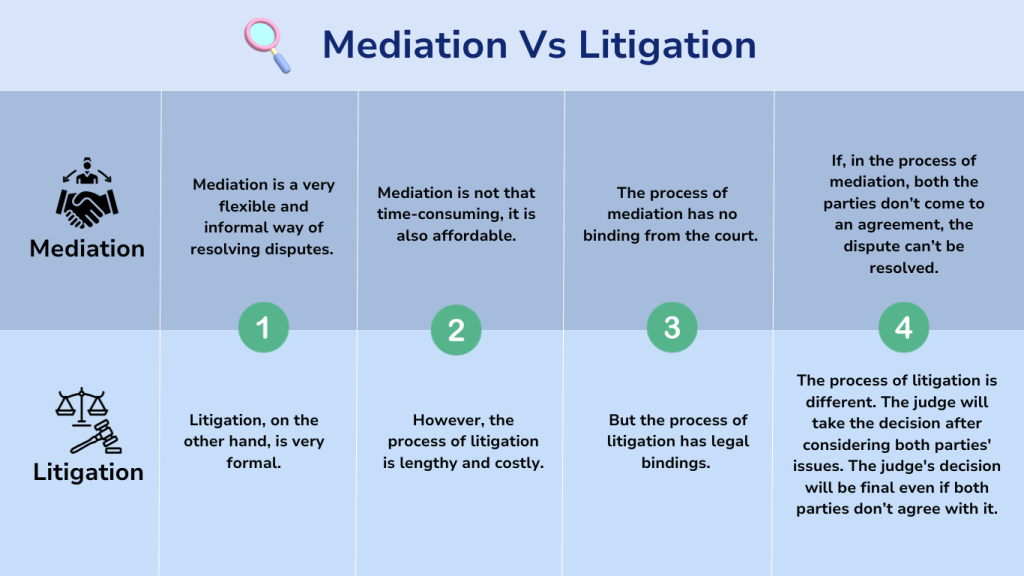The world is filled with diverse opinions and interests which make avoiding disputes inevitable. Sometimes these disputes can turn into legal trouble. Which, as a result, can harm the reputation of your business. So it becomes important to manage these disputes.
When any dispute arises, especially in business or professional life, it is important to have a dispute resolution process. Sometimes this process can be lengthy, time-consuming, overwhelming, and emotionally draining.
However, there are alternative methods available for resolving disputes that are not so time-consuming and don’t involve courtroom drama. This blog explores different alternative dispute resolution processes and methods, such as mediation, arbitration, and litigation.
We will learn about the differences between them and that will help you in making informed decisions when any conflict arises. But first, you need to know more about alternative dispute resolution (ADR).
Overview of Alternative Dispute Resolution (ADR)
Alternative dispute resolution refers to a range of dispute resolution methods. ADR procedures help both the parties involved to come to a common ground without going to court. Alternative dispute resolution systems usually involve third parties who help in settling the disputes. In some cases, the ADR process is used along with the litigation process. ADR methods are a more flexible, efficient, and less expensive way of resolving disputes. There are a few different types of alternative dispute resolution, such as mediation, arbitration, and litigation.
Types Of Alternative Dispute Resolution
Here are a few types of alternative dispute resolution:
Mediation
Mediation is one of the most flexible ways of resolving disputes between the parties. Mediation proceedings are not very formal. In this process, both parties can confidentially share their concerns, issues, needs, and wishes with the neutral mediator.
Mediation settles downs on an average within 45 days, which is why many people choose mediation over other processes.
These mediators don’t offer any legal advice or make decisions, as he is not a judge. They simply listen to both parties impartially and help in facilitating the conversation for settlement. After that, both parties come to a conclusion and are ready for settlement. The mediator will draft a legal document that both the parties will sign and they will be bound to that agreement. In comparison to arbitration or litigation, this is more affordable and there is no need to hire an attorney for it.
Arbitration
Arbitration is more like a quasi-legal process. In this process, a qualified arbitrator or panel of multiple arbitrators sits and listens to the disputes of both parties. Usually, the Federal Arbitration Act governs the arbitrations. However, certain industries and parties can choose alternative governing rules according to industry. It is more expensive than the process of mediation, but still cheaper than the process of litigation. Arbitration clauses bind both the parties in a way similar to the legal agreement.
It is somewhat similar to the lawsuit and requires an attorney. Both parties can conduct discovery and get more information about the other party for collecting evidence. The process involves hearings similar to that of the court. Arbitration process revenue has increased after 2020.
Litigation
When it comes to litigation, it is a traditional way of resolving disputes. It involves lawsuits, judges, courtrooms, and hearings. This is a more formal approach to resolving the dispute. It is an adversarial process that can be very time-consuming and costly at the same time. Companies in the US have spent around 22.8 billion U. S for the process of litigation.Most of the parties usually opt for litigation when they cannot resolve disputes with the help of other methods.
Mediation Vs. Arbitration Vs. Litigation
Arbitration Vs Mediation

Mediation is a process in which both parties share their issues with a common professional mediator. On the other hand, arbitration involves a professional arbitrator in the process. In mediation, none of the parties involved has any binding intervention. But in arbitration, both the parties have a binding to a law. Arbitration is a more formal process in comparison to mediation. It involves a discovery process in which both parties can ask for documents or data from to bolster their case. Whereas the process of discovery is missing in mediation.
Arbitration Vs. Litigation

Arbitration is a less formal way of resolving disputes in which a third party serves as a judge. It helps both parties find common ground. Litigation is different from it because, in the litigation process, a judge presides over the matter and resolves disputes in a legal manner. Litigation is not as flexible as the process of arbitration.
An arbitrator is usually a lawyer or someone with a legal background, but their decision bindings don’t have law enforcement. Whereas litigators’ decisions have legal bindings.
Mediation Vs. Litigation

Mediation is a very flexible and informal way of resolving disputes and litigation on the other hand is very formal. Mediation is not that time-consuming, it is also affordable. However, the process of litigation is lengthy and costly. The process of mediation has no binding from the court, but the process of litigation has legal bindings. If, in the process of mediation, both the parties don’t come to an agreement, the dispute can’t be resolved. The process of litigation is different. The judge will take the decision after considering both parties’ issues. The judge’s decision will be final even if both parties don’t agree with it. The litigation process is more structured in comparison to mediation.
Alternative Dispute Resolution Procedures

Here are the common steps of the alternative dispute resolution program:
- The first step is negotiation. In this, both parties sit together to communicate and reach an agreement. This is the most informal method of resolving disputes.
- If the issue doesn’t get resolved by negotiation. Both parties can involve a third party person, aka mediator. The mediator will listen to both sides and help them come to an agreement.
- Now comes the process of arbitration. In this arbitrator offers a binding or non-binding decision after considering the evidence of both parties.
- Next is the conciliation process. In this, a neutral conciliator helps both parties to find a common ground.
- If the conciliator can’t bring both parties to common ground. They have to move to collaborative law. In collaborative law, attorneys of both parties come together to have a discussion and try to come to a common agreement.
- Then a mini-trial takes place. Here, a structured negotiation process takes place, and senior executives of both parties present evidence for the case.
- Early neutral evaluation takes place after that. Here, a neutral expert evaluates the case and helps both parties understand their case strengths and weaknesses.
- Now restorative justice takes place. This is especially true in the case of criminal justice. This focuses on repairing offenders’ harm to the community.
The Bottom Line
Alternative Dispute Resolution is an effective way of resolving disputes. There are different types of ADR processes that help with resolution. Above in the blog we have mentioned some of the methods that you can choose for resolving your issues. If you want less legal compliance, you can opt for the mediation process or else you can move to arbitration. But if you want everything in a proper legal way, you should go for litigation.

